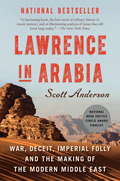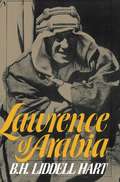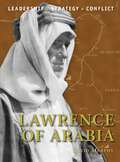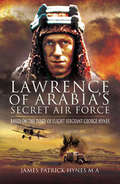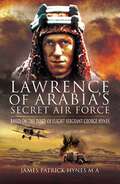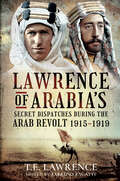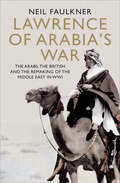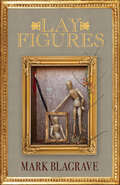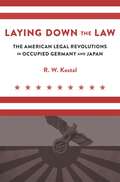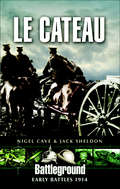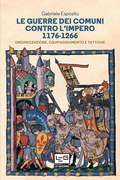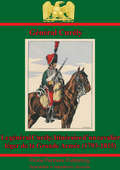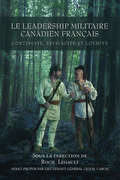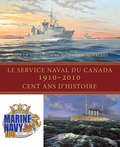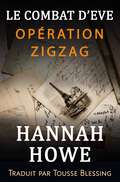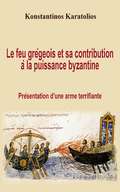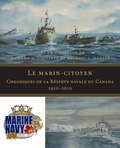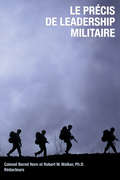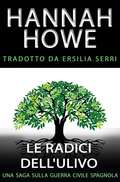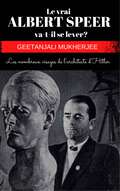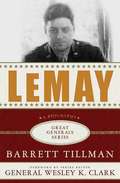- Table View
- List View
Lawrence in Arabia: War, Deceit, Imperial Folly and the Making of the Modern Middle East
by Scott AndersonNATIONAL BESTSELLER • A New York Times Notable Book • Finalist for the National Book Critics Circle Award in Biography • A thrilling and revelatory narrative of one of the most epic and consequential periods in 20th century history – the Arab Revolt and the secret &“great game&” to control the Middle East&“A fascinating book, the best work of military history in recent memory and an illuminating analysis of issues that still loom large today."—The New York Times"Brilliant. . . . A dazzling accomplishment that combines superb historical research with a compelling narrative.&”—The Seattle TimesThe Arab Revolt against the Turks in World War I was, in the words of T. E. Lawrence, &“a sideshow of a sideshow.&” As a result, the conflict was shaped to a remarkable degree by a small handful of adventurers and low-level officers far removed from the corridors of power.At the center of it all was Lawrence himself. In early 1914 he was an archaeologist excavating ruins in Syria; by 1917 he was riding into legend at the head of an Arab army as he fought a rearguard action against his own government and its imperial ambitions. Based on four years of intensive primary document research, Lawrence in Arabia definitively overturns received wisdom on how the modern Middle East was formed.One of the Best Books of the Year: NPR, The Christian Science Monitor, The Seattle Times , St. Louis Post-Dispatch , Chicago Tribune
Lawrence of Arabia
by B. H. Liddell HartT. E. Shaw, better known as Lawrence of Arabia, was one of the most romantic, heroic, and enigmatic figures of his day. The subject of myth and hagiography, he was equally accomplished in several fields-as archaeologist, diplomat, writer, and soldier-and he worked throughout World War I and after in the Middle East in efforts to promote independent Arab states. His autobiography Seven Pillars of Wisdom is one of the greatest works of its kind. The esteemed military historian B. H. Liddell Hart wrote this study of Lawrence in order to pierce the clouds of legend. He discussed Lawrence's Oxford days, his experiences as an intelligence officer in Egypt, and in particular the tactics of guerrilla warfare he practiced so effectively against the large Turkish armies during World War I. Liddell Hart was one of the few to give Lawrence his full justice as both a man and a brilliant soldier. Long out-of-print, this book unravels the many puzzling features of Lawrence's story and restores him to his proper place as one of the twentieth century's heroic, but very human, figures.
Lawrence of Arabia
by B. H. Liddell HartB. H. Liddell Hart’s Lawrence of Arabia is an authoritative and compelling biography of T.E. Lawrence, the enigmatic and legendary figure who played a pivotal role in the Arab Revolt during World War I. Written by one of the 20th century’s most respected military historians, this book provides a deeply nuanced portrait of Lawrence as both a military strategist and a complex individual shaped by extraordinary circumstances.Drawing on extensive research, personal correspondence, and firsthand accounts, Liddell Hart explores Lawrence’s transformation from an Oxford scholar of Middle Eastern archaeology into a revolutionary leader and guerrilla warfare expert. The book delves into Lawrence’s alliances with Arab leaders, his daring campaigns against the Ottoman Empire, and his role in uniting diverse tribes under a common cause.Liddell Hart also examines Lawrence’s groundbreaking strategies in asymmetrical warfare, offering insights into his military genius and the enduring influence of his tactics. At the same time, the biography captures Lawrence’s internal struggles with fame, his sense of betrayal during the postwar peace negotiations, and his enduring quest for purpose.With its rich detail and balanced perspective, Lawrence of Arabia sheds light on the man behind the legend, presenting a vivid account of his life and legacy in both military and political history. Liddell Hart’s masterful writing ensures this biography is as engaging as it is informative, offering readers a profound understanding of one of the most fascinating figures of the modern era.Perfect for history enthusiasts, military scholars, and fans of epic biographies, Lawrence of Arabia is a timeless exploration of leadership, courage, and the complexities of shaping history.
Lawrence of Arabia
by Giuseppe Rava David MurphyThomas Edward Lawrence, more popularly known as Lawrence of Arabia, was one of the most iconic figures of the 20th century, immortalized on stage and screen, whose exploits in the Middle East in the second half of World War I helped shape the campaign in that part of the world. In the course of two brief years, Lawrence emerged as one of the main strategic and tactical minds behind the Arab Revolt. He went from being an obscure staff officer to the rank of full colonel and became one of the men who shaped the modern Middle East. From being a pure amateur, he also developed desert tactics that would be used throughout World War II and afterwards. This new Command title provides an in-depth analysis of every aspect of Lawrence's storied military career.From the Trade Paperback edition.
Lawrence of Arabia's Secret Air Force: Based on the Diary of Flight Sergeant George Hynes
by James Patrick HynesX Flight was designated the task of giving close air support to the desert army formed and commanded by Lawrence of Arabia. It flew from advanced desert landing grounds on reconnaissance, liaison, bombing and ground attack missions. The existence and deeds of the flight were kept secret, so much so that even the RFC Paymaster was unaware of their existence.George Hynes was an aircraft mechanic and became responsible for keeping the flights somewhat elderly aircraft airworthy whilst working in the most difficult desert conditions on hastily constructed landing strips and living and working under canvas in temperatures that froze at night and rose to 100 degrees plus at noon.His diary gives a clear insight into the conditions endured, the actions that took place and the many almost insurmountable problems that occurred as they followed Lawrences steady advance against the numerically superior Turkish Army and Air Force. George personally encountered Lawrence on many occasions and maintained contact with him after the war.The diary is supported with the Flights weekly operational records, perspectives of the battle scenarios and other background information.
Lawrence of Arabia's Secret Air Force: Based on the Diary of Flight Sergeant George Hynes
by James Patrick HynesX Flight was designated the task of giving close air support to the desert army formed and commanded by Lawrence of Arabia. It flew from advanced desert landing grounds on reconnaissance, liaison, bombing and ground attack missions. The existence and deeds of the flight were kept secret, so much so that even the RFC Paymaster was unaware of their existence.George Hynes was an aircraft mechanic and became responsible for keeping the flights somewhat elderly aircraft airworthy whilst working in the most difficult desert conditions on hastily constructed landing strips and living and working under canvas in temperatures that froze at night and rose to 100 degrees plus at noon.His diary gives a clear insight into the conditions endured, the actions that took place and the many almost insurmountable problems that occurred as they followed Lawrences steady advance against the numerically superior Turkish Army and Air Force. George personally encountered Lawrence on many occasions and maintained contact with him after the war.The diary is supported with the Flights weekly operational records, perspectives of the battle scenarios and other background information.
Lawrence of Arabia's Secret Dispatches During the Arab Revolt, 1915–1919
by T.E. LawrenceT. E. Lawrence’s dispatches during the Arab Revolt have been published before, but only in an edited and incomplete form, as they were printed for a strictly limited wartime readership in the Arab Bulletin. Now, in this scholarly edition, they are published in full for the first time. They give us a direct inside view of his dealings with the Arab leaders and show us how he presented them to his superiors in Cairo. These wartime writings reveal vividly his impressions of the periods he spent in the desert and the conditions he found there, and they record how the Arab uprising developed and how he became increasingly involved in it. They make fascinating reading for, in his sometimes outspoken way, he reported on the military potential of the Arab fighters and recommended how they should be supported in their struggle against the Ottoman empire. This new collection of his dispatches is a valuable addition to the literature on Lawrence for it allows readers to trace the course of the revolt as he wrote about it at the time. They are printed in chronological order with full explanatory notes. The editor Fabrizio Bagatti provides a perceptive introduction which sets them in their wartime context, fills in the military and political background to the strategic situation in the Middle East and describes Lawrence’s important role as an intermediary between the Arabs and the British.
Lawrence of Arabia's War: The Arabs, the British and the Remaking of the Middle East in WWI
by Neil FaulknerThis radically new perspective on T. E. Lawrence, the Arab Revolt, and WWI in the Middle East provides essential insight into today&’s violent conflicts. Archaeologist and historian Neil Faulkner draws on ten years of field research in the Middle East to offer the first truly multidisciplinary history of the conflicts that raged in Sinai, Arabia, Palestine, and Syria during the First World War. Rarely is a book published that revises our understanding of an entire world region and the history that has defined it. This groundbreaking volume makes just such a contribution. In Lawrence of Arabia&’s War, Faulkner sheds new light on British intelligence officer T. E. Lawrence and his legendary military campaigns. He explores the intersections among the declining Ottoman Empire, the Bedouin tribes, rising Arab nationalism, and Western imperial ambition. Faulkner arrives at a provocative new analysis of Ottoman resilience in the face of modern industrialized warfare. This analysis leads him to reassesses the relative weight of conventional operations in Palestine and irregular warfare in Syria—and thus the historic roots of today&’s divided, fractious, war-torn Middle East.
Lawson (Delta Squad #1)
by Diana GardinWhen a fake relationship turns real, this Navy SEAL learns that love can be deadly in this thrilling, fast-paced novel that proves "no one does romantic suspense like Diana Gardin" (Susan Stoker, New York Times bestselling author). I'm a natural protector, whether I'm guarding political big shots or celebrity VIPs. It's true that I failed - once. When I was a SEAL, when it mattered most. But that's never going to happen again. Especially not during my first op with Night Eagle Security. So if there's one thing my new partner, Indigo Stone, should know, it's that she's safe in my hands.... Not that she wants my help. With amber eyes full of intelligence and a body covered in ink, Indigo is one of the toughest people I've ever met. But this job has us deep undercover, playing car thieves and lovers, and we'll have to become pros at faking it. But when feelings turn real, I'm reminded that emotions are dangerous... especially when one wrong move can be deadly.
Lay Figures
by Mark BlagraveElizabeth MacKinnon moves to Saint John New Brunswick in 1939 to find inspiration for her poetry in the bohemian life of the city's central peninsula. Swept up in the vibrant society of the city's poets, painters, potters, dancers, and playwrights, she finds herself joining their struggles to make sense of making art in a time of economic depression. Inhabiting the lives of the artists who find themselves in the port city taking refuge from the Depression, Lay Figures explores relationships between art and lived experience, artist and subject, artist and audience, and between margins and centre, and traces the development of a young female writer against the backdrop of the Depression and early war years in Saint John. In a story that couples bitter despair with exuberant triumphs, Elizabeth and her fellow artists make life-changing discoveries about politics and social responsibility, desire and betrayal.
Laying Down the Law: The American Legal Revolutions in Occupied Germany and Japan
by R. W. KostalAfter WWII, U.S. leaders sought to create liberal rule-of-law regimes in Germany and Japan, but the effort was often unsuccessful. Kostal argues that the manifest failings of America’s own rule-of-law democracy were partially to blame, weakening U.S. credibility and resolve and revealing the country’s ambiguous status as a global moral authority.
Lazarus
by Sarah CawkwellWelcome to an alternate 1870s where the heroism and hubris of humanity in this era of steam and steel have unlocked secrets that the world was unprepared for, as super-science and alien technologies bring about an exciting and unpredictable age. The Dystopian Age.
Le Cateau (Battleground Early Battles 1914)
by Nigel Cave Jack SheldonLe Cateau (26–27 August 1914) was the second major action fought by the BEF in the Great War. His men exhausted after fighting at Mons and by the subsequent speedy retreat, Lieutenant-General Horace Smith-Dorrien (commanding II Corps) decided that he had to make a stand in the vicinity of Le Cateau.There his men took on elements of four German corps in an action that succeeded in giving the BEF a respite, but at considerable cost. Amongst other elements of controversy in the conduct of the battle was the handling of the Royal Artillery.The battle also undermined the already fraught relationship between Smith-Dorrien and the BEF's commander, John French. The battlefield today remains largely as it was, open countryside, and it is an ideal location to view one of the most significant British battlefields of the early days of the war.In this action no less than five Victoria Crosses were won, three of them in one howitzer battery and two by men of the 2nd King's Own Yorkshire Light Infantry.
Le Combat d'Ève- Opération Serrurier
by Hannah HoweLes personnages du Combat d’Ève sont fictifs. Cependant, toutes les histoires et les incidents qu'elles contiennent, du personnel au public, sont basés sur des faits réels.Le Combat d’Ève est une série de douze livres, chaque livre ayant environ 20 000 mots et un écart de publication de deux mois. À la fin de chaque livre, vous trouverez des biographies des véritables héros et héroïnes notamment ceux des personnages incarnés par Eve Beringar, Guy Samson et Mimi Duchamp. Çà été un honneur de lire des histoires sur des personnes pleines de dignité et essentiellement courageuses. J’ose croire que vous serez épris par leurs parcours dans le Combat d’Ève.
Le Guerre Dei Comuni control L'Imero 1176-1266: Organizzazione, equipaggianmento e Tattiche
by Gabriele EspositoIl primo libro di una nuova serie di monografie di storia militare, intitolato "Warriors and soldiers of Italy" e interamente prodotto con materiali originali nel nostro Paese: un testo agile e molto informativo, adatto a qualsiasi tipo di lettore e avulsione da parte del "mondo accademico" pesantezza, con tavole a colori originali, realizzate appositamente a supporto del testo e raffiguranti i soldati descritti nel libro, un ampio apparato iconografico che combina immagini vintage con ricostruzioni moderne prodotte fedelmente dai migliori gruppi di reenactors e riprodotte in foto ad alta definizione. Il volume analizza gli eventi centrali dello scontro tra l'Impero italiano ei Comuni, seguendo il leitmotiv di quattro grandi battaglie, esemplari per comprendere il panorama degli eserciti descritti: Legnano (1176), Cortenuova (1237), Montaperti (1260) e Benevento (1266). È in italiano con una sinossi inglese di ogni sezione.
Le Général Curély. Itinéraire D’un Cavalier Léger De La Grande Armée (1793-1815)
by Général Baron Jean-Nicolas CurélyLe général Curély. Itinéraire d'un cavalier léger de la Grande Armée (1793-1815), publié d'après un manuscrit authentique par le général Thoumas. Paris, Berger-Levrault, 1887, in-16, X-436 p., portr.« Malgré son titre, il s'agit bien de mémoires sur les campagnes de 1805, 1806, 1807 et 1809. La Russie, l'Allemagne, Waterloo sont également évoqués dans un panorama complet qui ne s'élève jamais au-dessus d'une stricte narration des aventures personnelles du brillant cavalier que fut Curély. » p 45 - Professeur Jean Tulard, Bibliographie Critique Des Mémoires Sur Le Consulat Et L'Empire, Droz, Genève, 1971.
Le Leadership militaire canadien français
by Colonel Bernd Horn Roch Legault Lieutenant-General J.H.P.M CaronLes Canadiens francais ont une longue et fière tradition de service envers leur pays. Cette tradition est plus que manifeste au sein de la profession de armes. Déjà du temps des premières colonies, les Canadiens francais ont marqué leur nouveau pays en le défendant. Ils ont joué un rôle critique comme combattants contre des autochtones hostiles et les autres puissances européennes colonisatrices. A la suite de la Conquête, ils ont continué, quoique sous une allégeance différente, à défendre le Canada. Ainsi, ce livre met en lumière le dévouement et les contributions d'un certain nombre de leaders canadiens francais envers leur pays en temps de paix, de crise et de guerre, de l'époque de la Nouvelle-France a la fin du vingtième siècle.
Le Service naval du Canada, 1910-2010: Cent ans d'histoire
by Richard H. Gimblett The Right Honourable Michaëlle JeanLa Marine canadienne a eu 100 ans en 2010, et le Canada a fièrement célébré cet anniversaire. Connue officiellement jusqu’en 1968 comme la Marine royale du Canada, et après comme le Commandement maritime des Forces canadiennes, le service naval du Canada a joué un rôle important dans le développement et la securité de notre pays. Son Excellence la gourverneure générale Michaelle Jean, commandante en chef des Forces canadiennes, a écrit l’avant-propos de cet ouvrage commémoratif richement illustré. Dans cette collection d’articles, tous écrits par d’éminents historiens specialistes de leur période, chaque chapitre est consacré à une période de l’histoire de la Marine: ses origines remontant à 1867, les deux guerres mondiales, la guerre de Corée, la Guerre froide, et sur l’avenir de la Marine ; il y a également un chapitre sur les oeuvres des peintres de guerre. Les auteurs des chapitres font référence à une multitude d’archives et d’ouvrages d’autres auteurs dans leurs écrits. Ce livre se veut un tour d’horizon général qui saura plaire à de nombreux lecteurs, notamment les passionnés de marine, les anciens de la marine et leur famille, les historiens et les bibliothécaires.
Le combat d'Ève
by Hannah HoweLes personnages des combats d’Eve sont fictifs. Cependant, toutes les histoires et les incidents qu’elles contiennent, du personnel au public, sont basés sur des faits réels.Ce livre débute avec un prologue prolongé. Le prologue dans son entièreté couvre les trente premières années de la vie d'Eve et relate son parcours, énumère ses capacités, ses croyances et ses défis.Le combat d’Eve est une série de douze livres, chaque livre ayant environ 20 000 mots et un écart de publication de deux mois. À la fin de chaque livre, vous trouverez des biographies des véritables héros et héroïnes de ces personnages, notamment : Eve Beringar, Guy Samson et Mimi Duchamp (Guy et Mimi interviendront dans le livre deux). Çà été un honneur de lire des histoires sur ces personnes pleines de dignité et essentiellement courageux. J’ose croire que vous serez épris par le parcours et les exploits de mes personnages dans le combat d’Eve.
Le feu grégeois et sa contribution à la puissance byzantine: présentation d’une arme terrifiante
by Konstantinos Karatolios Naïma Paradis JoyalLa grandeur millénaire de l’Empire byzantin aurait été impossible sans la contribution de ses forces armées. Grâce à elles, il a pu maintenir une position de force par rapport aux défis constants que lui faisaient subir ses rivaux. À cet égard, l’héritage des Romains est aussi important que l’adoption de nouvelles armes et tactiques de combat. Le feu grégeois, s’il n’est pas l’arme principale de ces forces, est certainement celui qui a atteint la plus grande renommée. Utilisé tout au long de l’ère byzantine, il a consenti de retentissantes victoires à sa marine. Cette arme terrifiante relève presque de la légende, car pratiquement tout ce que nous en savons aujourd’hui est assombri par l’ambiguïté des documents d’époque. Dans cet ouvrage, Konstantinos Karatolios tente de répondre à une série de questions concernant le feu grégeois : quelle était sa composition? À quel point était-il efficace? Qui l’a réellement inventé? Comment était-il utilisé lors des combats terrestres et maritimes? Cet ouvrage vise d’abord à fournir au lecteur non averti une vue d’ensemble sur l’état actuel des recherches. Ensuite, son objectif est d’apporter sa propre contribution sur le sujet, tout en respectant la méthode scientifique.
Le marin-citoyen: chroniques de la réserve navale du Canada, 1910–2010
by Richard H. Gimblett Michael L. HadleyCe livre commémoratif, produit à l’occasion du Centenaire de la Marine canadienne 1910–2010, traite d’une double citoyenneté particulière : celle des Canadiens exerçant le métier de la mer au service du Canada, tout en répondant aux devoirs de leurs activités civiles, chez eux, dans leur communauté. Les points de vue de ces citoyens marins à temps partiel, qui ont constitué la Réserve navale du Canada au cours des cent dernières années, offrent une autre histoire intéressante, utile et opportune de la Marine canadienne. La plupart des personnes ayant contribué à ce livre ont servi dans la Réserve navale du Canada, et tous sont des autorités respectées dans leur domaine. Lu isolément ou comme complément du livre Le service naval du Canada, 1910-2010 : Cent ans d’histoire (Dundurn, 2009), les lecteurs trouveront beaucoup de plaisir et d’information dans cette riche combinaison de textes, de photos et d’illustrations de personnes, de navires et d’aéronefs qui ont formé une fière institution nationale.
Le precis de leadership militaire
by Robert W. Walker Colonel Bernd HornExprimé en toute simplicité, le leadership consiste à influencer les gens afin d'atteindre un quelconque objectif qui a de l'importance pour le chef, le groupe et l'organisation. C'est l'élément humain qui permet aux chefs de diriger, de motiver et d'inspirer les troupes, surtout en temps de crise, lorsque la situatioin est chaotique et complexe et que les directives, les déclarations officielles et les communiqués ne produisent guère d'effet sur les subalternes gelés, épuisés et tendus. Un bon leadership incite les subordonnés à aller au-delà du devoir d'obéissance et à se dévouer pour la réussite de la mission, d'une manière qui contribue à maximiser leur plein potentiel. Le Précis de leadership militaire est un manuel concret et compréhensif qui identifie, décrit, et explique tous les concepts, thèmes et idées qui s'appliquent directement ou indirectement au leadership militaire. Ce livre est un sommaire compréhensif qui a comme point de mire plusieurs sujets dont la cohésion, le commandement, l'intelligence culturelle, la discipline, la peur et la confiance. Ce précis offre une assistance à qui veut mieux comprendre la théorie et l'application du leadership militaire.
Le radici dell'ulivo: Una saga sulla guerra civile spagnola (L'Ulivo #1)
by Hannah HoweL'Ulivo - Saga sulla guerra civile spagnola Ambientato tra aprile 1937 e dicembre 1938, l'Ulivo è una mini-serie di cinque romanzi basati su eventi reali. Le sue storie - Radici, Rami, Foglie, Frutta e Fiori - raccontano la vita di Heini Hopkins, una giovane infermiera che vive in una zona impoverita del Galles del Sud, e Naomi Parker, un'autrice ricca con un background privilegiato. In Radici, Heini è a casa, in Galles, ad assistere la madre malata mentre Naomi partecipa alle feste di lancio del suo ultimo romanzo. La guerra civile in Spagna sembra un mondo lontano, fino a quando i fascisti bombardano e distruggono Guernica, uccidendo centinaia di uomini, donne e bambini. Il fidanzato di Heini, Deiniol Price, minatore di carbone, sente di doversi unire alla causa della Repubblica Spagnola e offrirsi volontario nelle Brigate Internazionali mentre l'amante di Naomi, il conte Nicolas Esteban, sogna la gloria, combattendo per i fascisti nell'aviazione. Le donne dovrebbero lasciare la sicurezza del Galles per i terribili campi di battaglia spagnoli? E se davvero decidessero di seguire i loro uomini, quale destino le attenderebbe?
Le vrai ALBERT SPEER va-t-il se lever ?: Les nombreux visages de l'architecte d'Hitler
by Geetanjali MukherjeeAlbert Speer, l'architecte d'Hitler, a reçu plusieurs titres - "le bon nazi", "l'architecte d'Hitler", "le futur chancelier du Reich" et même "le seul accusé pénitent à Nuremberg". Il a présenté plusieurs visages au monde, mais lequel était authentique ? Speer a été largement impliqué dans le parti nazi, à la fois en tant qu'architecte d'Hitler et ministre de l'armement, et à travers ses contributions à la guerre illégale menée par le régime. Ainsi, la question se pose naturellement : Speer a-t-il reçu une punition adéquate ? Les événements qui ont précédé le procès de Nuremberg, et le procès lui-même, fournissent des indices pour répondre à ces questions : que pouvons-nous apprendre sur la personnalité de Speer à partir des preuves disponibles, et pourquoi est-ce important ? Dans les années qui ont suivi le procès, les biographes ont été fascinés par la vie de Speer et ont tenté de comprendre l'homme derrière l'énigme. La raison de la fascination tient autant à sa proximité avec Hitler et le régime qu'à ses actions à la fin de la guerre. Étaient-ils justifiables ? Le plus gros défaut de Speer était-il son ambition et son refus d'actes manifestement inhumains ? Ou Speer a-t-il réussi à enlever le tour de magie ultime pour convaincre le tribunal de son implication involontaire, tout en soutenant sans réserve le traitement réservé par les régimes nazis à ceux qu'ils opprimaient ?
LeMay: A Biography
by Barrett TillmanLeMay was a terrifying, complex, and brilliant general. In World War II, he ordered the firebombing of Tokyo and was in charge when Atomic bombs were dropped on Hiroshima and Nagasaki. He was responsible for tens of thousands of civilian deaths--a fact he liked to celebrate by smoking Cuban cigars. But LeMay was also the man who single-handedly transformed the American air force from a ramshackle team of poorly trained and badly equipped pilots into one of the fiercest and most efficient weapons of the war. Over the last decades, most U.S. military missions were carried out entirely through the employment of the Air Force; this is LeMay's legacy. Packed with breathtaking battles in the air and inspiring leadership tactics on the ground, LeMay will keep readers on their edge of their seats.
